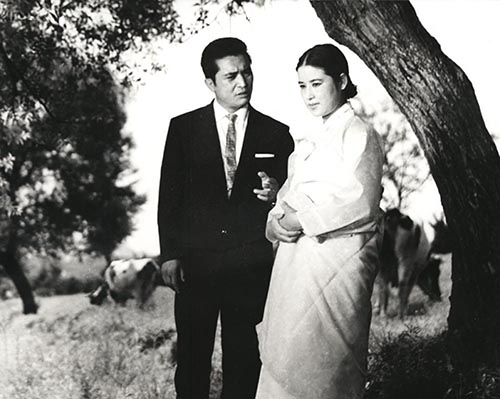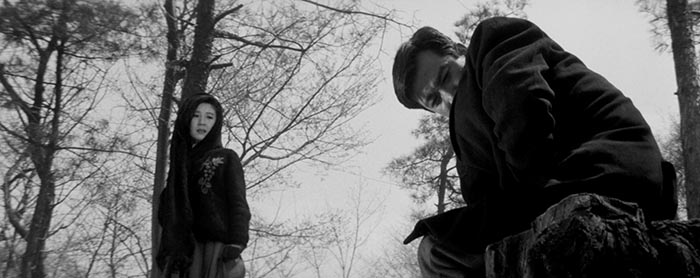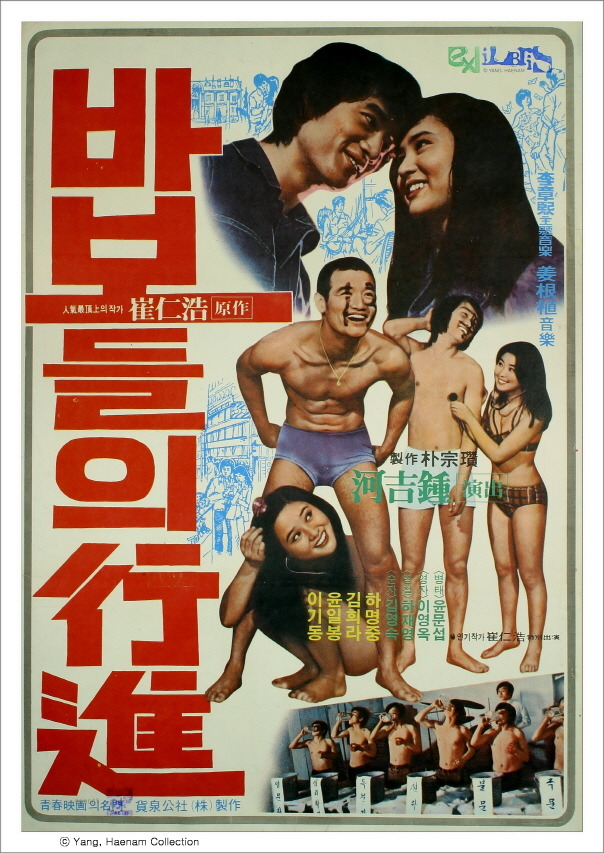CulBeat Express
2018.12.13 14:48
MoMA '바보들의 행진' 상영 취소, '사랑방 손님과 어머니' '휴일' 상영
조회 수 3784 댓글 0
<Update>
*'바보들의 행진' 상영이 취소되었습니다. 대신 신상옥 감독의 '사랑방 손님과 어머니'가 상영되며, 이만희 감독의 걸작 '휴일'이 추가로 상영됩니다.
Sarang bang sonnim omoni (My Mother and Her Guest). 1961. Directed by Shin Sang-ok
신상옥 감독, 김진규, 최은희 주연 '사랑방 손님과 어머니'(1961)
Monday, January 21, 1:30 p.m./ Tuesday, January 29, 7:00 p.m.

Sarang bang sonnim omoni (My Mother and Her Guest) 1961. South Korea.
Directed by Shin Sang-ok. Screenplay by Lim Hee-lae. With Kim Jin-kyu, Choi Eun-hee, Kim Hee-gap. In Korean; English subtitles. 103 min.
In a 50-year moviemaking career too insane to be believed, Shin Sang-ok brought international popularity to South Korean cinema in the 1950s and ’60s before he was kidnapped by North Korea in 1978. There, over the next seven years, he made musicals and melodramas that advanced Kim Il-sung’s Juche principles of self-reliance. In 1986, Shin fled with his wife Choi Eun-hee, the legendary star of his movies, to the United States, where he produced the successful Three Ninjas series in Hollywood. He ultimately returned to South Korea in the 1990s to make his last two features. My Mother and Her Guest, from 1961, was Shin’s first truly great film, a quiet melodrama about a widowed mother who falls for her tenant, a painter from the city.
Archival 35mm print from The Museum of Modern Art
https://www.moma.org/calendar/events/5068
--------------------------------------------------------
Hyuil (A Day Off). 1968. Directed by Lee Man-hee
이만희 감독, 신성일, 전지연 주연 '휴일'(1968)
Sunday, January 27, 1:30 p.m./ Tuesday, January 29, 4:00 p.m.

Hyuil (A Day Off). 1968. South Korea. Directed by Lee Man-hee. Screenplay by Baek Gyeol. With Jeon Ji-yeon, Shin Seong-il, Kim Sun-Cheol. In Korean; English subtitles. 73 min.
Unseen for decades, A Day Off is a masterpiece of 1960s Korean cinema. Lee Man-hee’s long-neglected melodrama, starring the legendary actor Shin Seong-il, shattered conventions of traditional Korean cinema with its Antonioni-esque modernist aesthetic and its depiction of poverty and despair in late 1960s Seoul. But the film never made it to Korean theaters in 1968. Censored (like The March of Fools) for its intimations of abortion and suicide, the film was forgotten until 2005, when the Korean Film Archive found and preserved a unique print in its collection. Today, A Day Off routinely appears on critics’ lists of the top 100 Korean films ever made. New digital preservation by the Korean Film Archive; courtesy Hong Young-soo
https://www.moma.org/calendar/events/5190
-------------------------
*'바보들의 행진' 상영회 취소
최인호 원작, 하길종 감독의 '바보들의 행진'(1975)이 뉴욕현대미술관(MoMA)의 내년 제 16회 복원영화제(1/4-31)에서 상영된다. 박정희 정부에 대한 비판으로 검열에서 삭제된 부분이 한국 영상자료원이 보관한 감독 편집판으로 볼 수 있다.
The March of Fools [Director’s Cut ]취소, '사랑방 손님과 어머니' 상영
1/21 월요일 1:30PM, 1/29 화요일 7PM@MoMA
최인호 원작 소설, 각색/ 윤문섭, 이영옥, 하재영, 하명중 출연
https://www.moma.org/calendar/events/5068

TO SAVE AND PROJECT, MoMA’S 16TH ANNUAL INTERNATIONAL FESTIVAL OF FILM PRESERVATION, PRESENTS NEWLY RESTORED MASTERWORKS AND CINEMATIC REDISCOVERIES FROM AROUND THE WORLD
Barbet Schroeder Opens the Festival with a Full Retrospective of His Documentaries, and Filmmaker Guests Also Include Peggy Ahwesh, George Griffin, Yvonne Rainer, and Arturo Ripstein
Festival Features Classics by Chantal Akerman, Ha Gil-jong, Ernst Lubitsch, Ida Lupino, Márta Mészáros, F. W. Murnau, Doris Wishman, and Many Others
To Save and Project: The 16th MoMA International Festival of Film Preservation
January 4–31, 2019
The Roy and Niuta Titus Theaters
NEW YORK, December 6, 2018—The Museum of Modern Art announces the 16th annual
edition of To Save and Project, a festival dedicated to celebrating newly preserved and
restored films from archives, studios, distributors, foundations, and independent filmmakers
around the world. Running from January 4 to 31, 2019, this year’s festival includes more than
50 newly preserved features and shorts from Asia, Europe, Africa, Latin America, and the
United States—virtually all of them North American or New York premieres—by filmmakers as
diverse as Fernando de Fuentes, André de Toth, Safi Faye, Ha Gil-jong, F. W. Murnau, and
Doris Wishman. Many of these films are receiving their first American screening since their
original release; others will be shown in meticulously restored versions that recapture the
long-lost sound and image quality of their initial release; and some will be publicly screened
for the first time ever in New York. To Save and Project is organized by Joshua Siegel, Curator,
Department of Film, The Museum of Modern Art.
To Save and Project opens with a tribute to Barbet Schroeder through all of his
documentaries. Schroeder, who is also celebrated for fiction films like Tricheurs, Reversal of
Fortune, Barfly, and Single White Female, will present his self-described “trilogy of evil”:
General Idi Amin Dada: A Self Portrait (1974), Terror’s Advocate (2007), and the New York
premiere theatrical run, from January 4 to 10, of The Venerable W. (2017). He will also
introduce new digital preservations of Koko: A Talking Gorilla (1978), The Charles Bukowski
Tapes (1985), and three rarely screened anthropological shorts made in 1971 in Papua, New
Guinea during the shooting of his fiction film The Valley (Obscured by Clouds).
Other highlights include special guest appearances by Peggy Ahwesh, Wolf-Eckart Bühler,
George Griffin, Barbara Hammer, Yvonne Rainer, and Arturo Ripstein; “The Great Victorian
Moving Picture Show”—two illustrated lectures of astonishing large-format 68mm Mutoscope
and Biograph shorts from the late 19th century—as well as an illustrated lecture on color
innovations in British silent cinema; Michael Anderson’s spy thriller The Quiller Memorandum
(1966), written by Harold Pinter and starring Alec Guinness, George Segal, and Max von
Sydow; an exceedingly rare screening of André de Toth’s Crime Wave (1954) in a pristine
35mm print struck from the original camera negative, together with two merciless
(auto-)portraits of the film’s leading actor, Sterling Hayden, made at the end of his life; and the
North American premiere of MoMA’s own restoration of Ernst Lubitsch’s Forbidden Paradise
(1924), in association with The Film Foundation. The festival concludes with the world
premiere theatrical run, from January 25 to 31, of MoMA’s new restoration of Ida Lupino’s
melodrama Never Fear (The Young Lovers) (1950).
Other highlights include:
Spotlight on Female Filmmakers. Female filmmakers are represented in depth
through narrative and documentary features by Chantal Akerman, Safi Faye, Ida
Lupino, Márta Mészáros, Wanda Tuchock, and Doris Wishman, as well as avant-garde
work by Peggy Ahwesh, Barbara Hammer, Jenni Olson, and Yvonne Rainer. Included
are new restorations of Belgian filmmaker Chantal Akerman’s Histoires d’Amérique:
Food, Family and Philosophy (1989), the Senegalese-French filmmaker Safi Faye’s
Fad’jal (1979), the Hungarian Márta Mészáros’ Ők Ketten (The Two of Them) (1979),
and MoMA’s new restoration of Yvonne Rainer’s Journeys from Berlin/1971, which is
presented in memory of the film’s “star” (scholar Annette Michelson, who died this
past September), with the American artist and choreographer Rainer present to
introduce. Also included are Doris Wishman’s recently preserved Nude on the Moon
(1961); Peggy Ahwesh’s The Color of Love (1994); Wanda Tuchock and George
Nicholls’s Finishing School (1934), a late pre-Code melodrama starring Ginger Rogers
and Frances Dee; and a weeklong run (January 24 to 31) of MoMA’s new restoration of
Ida Lupino’s Never Fear (The Young Lovers) (1950).
Rediscovering African American and LGBTQ Independent Cinema. To Save and
Project presents underappreciated independent African American and LGBTQ
filmmakers, including the New York premiere of writer-director Horace Jenkins’ Cane
River (1982), a film championed by Richard Pryor. The festival highlights the brief but
astonishing film career of Edward Owens with three experimental films from the late
1960s: Private Imaginings and Narrative Facts, Remembrance: A Portrait Study, and
Tomorrow’s Promise. Owens was marginalized for decades as a gay African American
artist.
For a special Martin Luther King Day celebration on January 21, the annual “Orphans
at MoMA” program presents rarities of African American and LGBTQ cinema. The
screening opens with Something Good—Negro Kiss (Selig Polyscope Co., 1898), a
burlesque of Thomas Edison's John C. Rice-May Irwin Kiss (1896), starring the black
performers Saint Suttle and Gertie Brown, newly preserved by the University of
Southern California Hugh M. Hefner Moving Image Archive. Orphans at MoMA also
includes Cab Calloway’s home movies, early television kinescopes, and vernacular
films from the Washington, DC, community, all newly preserved by the National
Museum of African American History and Culture; a rare 1966 TV newsfilm of Martin
Luther King Jr. on voting, from the University of South Carolina; and Nikolai Ursin’s
remarkably candid 1967 portrait of an African American trans woman, Behind Every
Good Man . . . , a 16mm preservation through the Outfest UCLA Legacy Project.
Orphans at MoMA also showcases the American filmmaker Barbara Hammer through
some of her earliest Super 8 works in their original small-gauge format: the abstract
Contribution to Light (1968), her psychodrama Death of a Marriage (1968), and
Aldebaran Sees (1969). These films heralded one of Queer Cinema’s most radical and
questioning artists.
50 years of LGBTQ independent cinema is further represented with New Queer
Cinema pioneer Curtis Harrington’s thriller Night Tide (1961), starring Dennis Hopper,
in a meticulous new digital restoration from the original camera negative and a finegrain
master, carried out by Cinema Preservation Alliance for byNWR. Also included
are Frameline’s new digital preservations of Jenni Olson’s short Blue Diary (1998) and
Arthur J. Bressan Jr.’s Buddies (1985).
Classics and Rediscoveries of Mexico and South Korea. Mexican writer-director
Arturo Ripstein will present a new restoration of his overlooked melodrama La mujer
del porto (The Woman of the Port) (1991), a tawdry tale of the docks adapted from a
short story by Guy de Maupassant and told from three perspectives. Ripstein also
presents the Filmoteca UNAM’s preservation of the original Woman of the Port (1934),
a masterwork of expressionistic Mexican popular cinema by Arcady Boytler, who
wrote, directed, and starred in films in his native Russia, associating with Sergei
Eisenstein, before moving to Mexico. Classic Mexican cinema is also represented with
the world premiere of UCLA Film & Television Archive and The Film Foundation’s
newly restored El fantasma del convento (The Phantom of the Monastery) (1934),
Fernando de Fuentes’ pioneering work of Mexican gothic horror.
Though widely admired as one of the great films of 1970s Korean cinema, Ha Giljong’s
Babodeuli haengjin (The March of Fools) (1975) was violently cut by censors
before its theatrical release. Thanks to the Korean Film Archive, Ha’s dark comedy can
be seen in its original Director’s Cut, painting an even more claustrophobic picture of
Korea’s lost generation during the dictatorial regime of Park Chung-hee.
Silent Cinema. In addition to MoMA’s restoration of Ernst Lubitsch’s Forbidden
Paradise, this year’s To Save and Project includes two other significant restoration
premieres from the silent era: the Munich Filmmuseum’s restoration of F. W. Murnau’s
Faust (1926), presented for the first time with celebrated novelist Gerhart
Hauptmann’s original intertitles; and the brand-new restoration of Fridrikh Ermler’s
intense psychological drama Fragment of an Empire (1929), a masterpiece of Soviet
cinema, in a collaborative effort of EYE Filmmuseum, Gosfilmofund of Russia, and the
San Francisco Silent Film Festival.
On January 12 and 13, To Save and Project presents three illustrated lectures on
astonishing innovations in silent cinema. In the first of two companion programs titled
“The Great Victorian Moving Picture Show,” BFI curator Bryony Dixon introduces
some of Britain's earliest and most spectacular films, documenting current events and
personalities of the late Victorian era with astonishing clarity on large-format 68mm
film. In the second program, archivist and historian Paul Spehr and MoMA archivist
James Layton present an illustrated lecture on early film pioneer W. K. L. Dickson,
with an emphasis on the remarkable cinematic advancements he made with the
American Mutoscope and Biograph Company at the turn of the 20th century. This
program features 68mm shorts from The Museum of Modern Art's Biograph
collection. On January 13, Bryony Dixon presents “Changing Hues: Color Innovations
in British Silent Cinema,” a beguiling journey through early color experiments and
innovations in British silent cinema, featuring a wide gamut of screen color techniques
from hand coloring to “natural” color processes like Kinemacolor and Biocolour.
A Spectrum of Projection Formats, from Small Gauge to Cutting-Edge Digital. This
year’s festival encompasses a wide range of projection formats, from small gauge to
the latest technological advancements in digital restoration. On January 21, Barbara
Hammer presents a rare screening of some of her earliest Super 8 films in their
original format. On January 12, “The Great Victorian Moving Picture Show” features
astonishing large-format 68mm Biograph films, which can be justly described as the
IMAX of turn-of-the century cinema. Throughout To Save and Project are 4K digital
restorations that have successfully rescued severely damaged or decomposing
negatives and prints through cutting-edge technologies, recapturing the long-lost
image and sound quality of their initial release.
See accompanying screening schedule for full program details and guest appearance dates.
Special thanks to Cindi Rowell, Olivia Priedite, and Julia Mettenleiter.
SPONSORSHIP:
Support for the exhibition is provided by the Annual Film Fund. Leadership support for the
Annual Film Fund is provided by the Kate W. Cassidy Foundation and Steven Tisch, with major
contributions from Jo Carole and Ronald S. Lauder, Association of Independent Commercial
Producers (AICP), Yuval Brisker Charitable Foundation, The Brown Foundation, Inc., of
Houston, Marlene Hess and James D. Zirin, K






